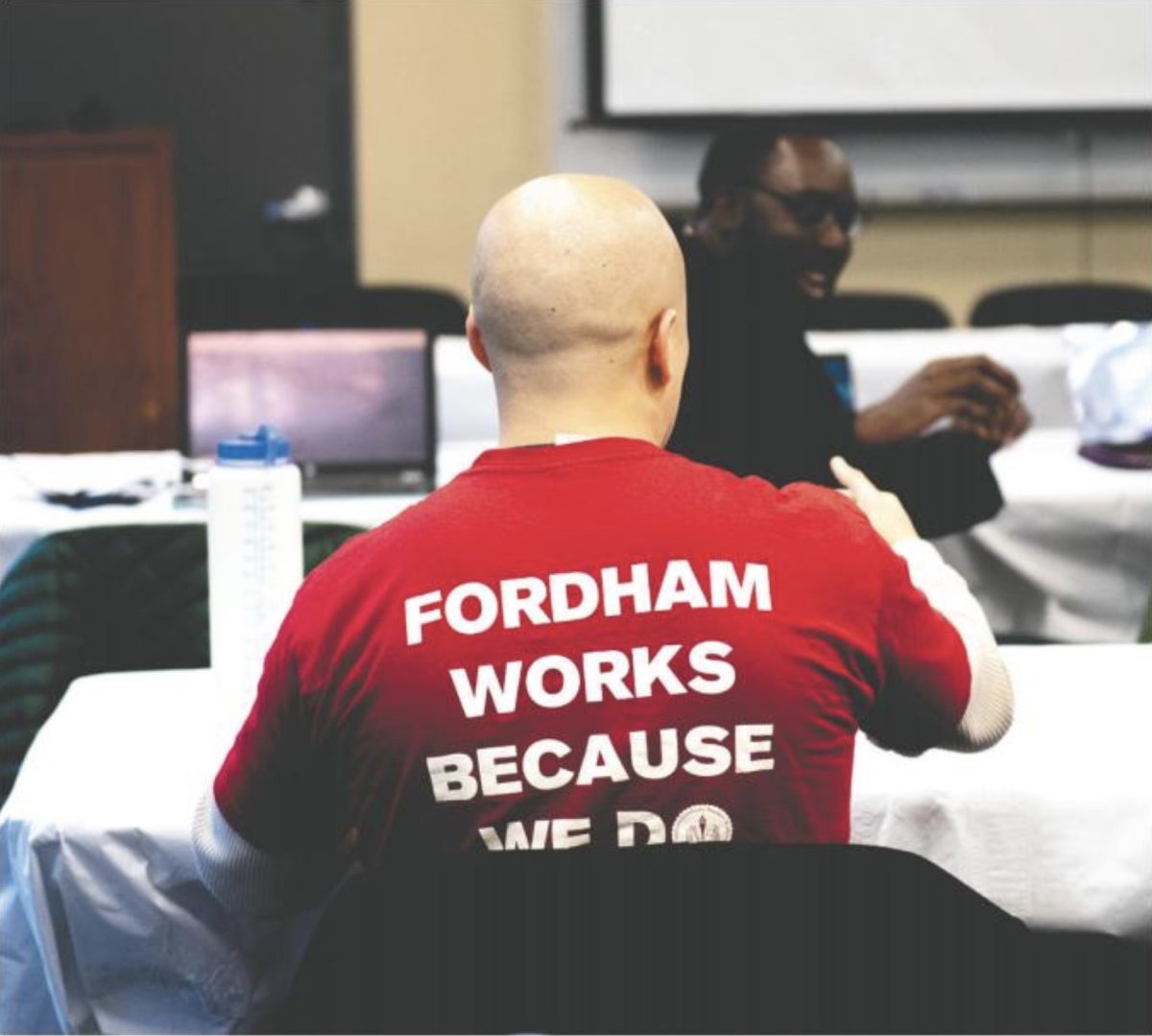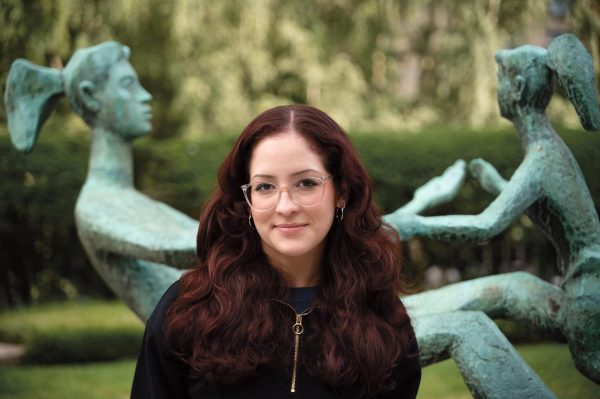The Fordham Graduate Student Workers Union (FGSW) remains in contract negotiations with Fordham University after a year and a half of bargaining sessions since the graduate students first unionized during the spring 2022 semester. FGSW has continued to demand higher pay and better healthcare benefits, two of the most significant areas of disagreement between both parties.
FGSW represents over 350 student workers at the Graduate School of Arts and Sciences (GSAS) during each semester. FGSW is negotiating its first contract, which will solidify and grant labor protections, increases in compensation and improvements to work benefits, including healthcare.
Members of the union include PhD candidates, some of whom are required to meet a pedagogy or teaching requirement at Fordham for their degrees. According to a tweet on Jan. 23 from the union on X, formerly known as Twitter, over 200 of its graduate student instructors teach courses that include more than 10,000 enrolled students per academic year.
In the 18 months since FGSW and the university have been bargaining, tentative agreements have been reached on numerous articles, such as academic freedom, protections for international student workers, and grievance and arbitration processes, among others.
Progression of the Bargaining Sessions
The union’s initial proposition for compensation for graduate student workers was a base pay of $60,000 dispersed over the academic year and has decreased to a starting stipend rate of $47,219 in what the union calls a “willingness to compromise.” Currently, the stipend rate for graduate student workers begins at $27,231.
Throughout negotiations, the university has only been willing to increase this stipend rate by $2969 since deliberations began in October of 2022. FGSW is advocating for higher compensation in order to meet New York City living wages, which according to the Massachusetts Institute of Technology is approximately $69,280 for a single adult.
Student workers are also subject to high healthcare premiums through an optional university-provided policy from Aetna. Students must be insured, regardless of whether they opt into Fordham’s health insurance policy or not. Union members also feel strongly that student workers should not be subject to general, technology, and international student services fees.
According to FGSW, graduate student workers making the base stipend rate paid 9.6% of their pre-tax compensation back to the university in fees and healthcare premiums, lowering the actual net income.
“It’s been almost two years since we unionized and they are still claiming that there isn’t money to pay their teachers while spending money on things like new executive positions.” Hilary Bylund, a PhD candidate studying theology in GSAS
The university did not respond to The Observer’s request for comment.
Amal Zaman, an English PhD candidate in GSAS, previously served as a bargaining committee member and was part of the union’s founding organizing committee. Zaman has expressed frustration with the little movement the university has made toward the union’s propositions on compensation and healthcare.
“When I talk to my students, and they express frustrations or nervousness about the job market, or like how they’re going to become adults, and what are they going to do, and how are they going to pay for things, I feel I’m also fighting for them,” Zaman said.
Calls for Healthcare Benefits
Healthcare premiums for graduate student workers are $1,427 per semester after a 67% subsidy is applied by the university. FGSW demands that the university be responsible for subsidizing the full cost of healthcare, since the healthcare policy is subject to premium increases and potential changes to the health plan. As of the most recent bargaining session on March 7, the university proposed a 25-50% coverage on a dental plan, though the cost of this is not yet known.
The university has proposed an 8% increase in the subsidy on the health insurance premium, which entails a subsidy of an undisclosed amount. Zaman explains that should the university choose to increase the cost of the health insurance, the current contractual agreement for the 67% subsidy could result in a raise of a premium costs anyways.
Hilary Bylund, a PhD candidate studying theology in GSAS, said that she came to Fordham because of its values but has become deeply disappointed and frustrated by what she characterizes as Fordham’s “unwillingness to address the unjust and dire working conditions” of some graduate workers with sufficient urgency.
“It’s been almost two years since we unionized and they are still claiming that there isn’t money to pay their teachers while spending money on things like new executive positions,” Bylund said.
Communicating with the Administration
In a press conference held on March 1, 2023 with The Observer and The Fordham Ram, Rose Hill’s undergraduate publication, University President Tania Tetlow said that the university is trying to balance “wanting to do right” by those employed by the university and students, who she says pays for full-ride graduate student scholarships and stipends through tuition.
“Right now we pay them as much or more than we would pay a part-time adjunct, who has a lot more experience, because we’re giving our graduate students a chance to learn how to teach, and many of them are brilliant at it,” Tetlow said.
Not all PhD students are actively taking coursework at the university, which is part of the tuition that Tetlow refers to. Zaman says she is working on her dissertation while teaching and is not enrolled in any classes. Currently, the cost of her enrollment is approximately $3,000. According to U.S. News and World Report, many PhD programs are fully funded by their respective institutions.
FGSW claims the university has sufficient funds to cover the cost of increased stipend rates for graduate student workers, and the union often points to administrative expenses that have increased while instruction and research costs have decreased according to 2022 and 2023 financial audit reports.

“Fordham’s upper administration tries to frame our fight as selfish or entitled to divide solidarity on campus by saying our wages will come out of student tuition or our colleagues’ salaries,” Zaman said. “But I want people to ask why this argument only shows up when instructors and workers ask for basic necessities like healthcare and never in regards to the six-figure salaries of upper administrators.”
According to Fordham’s financial audits and tax filings, numerous administrative positions are compensated at a salary higher than half a million dollars. In 2022, Dennis C. Jacobs, the provost and senior vice president of academic affairs, earned $651,282 in compensation, and Martha Hirst, former senior vice president, chief financial officer and treasurer, earned $613,746.
At the student press conference in March 2023, Tetlow also stated that an increase in graduate student worker pay in the multiples of what another “more experienced instructor” earns is an “ethical issue.”
“Right now we pay them as much or more than we would pay a part-time adjunct, who has a lot more experience, because we’re giving our graduate students a chance to learn how to teach, and many of them are brilliant at it.”University President Tania Tetlow
Under the contract for adjunct faculty members, represented by Fordham Faculty United (FFU), which was ratified in January 2023, part-time instructors with zero to three years of experience at the College of Arts and Sciences (CAS) will see an increase in compensation per course from $7,000 to $8,500 over the course of three years. Part-time instructors in the Graduate School of Social Services with a master’s degree and zero to three years of experience will see an increase from $4,900 to $6,900.
Total compensation may range from $27,600 to $34,000 for minimum experience and qualifications by 2026. Adjunct faculty members are capped at teaching two courses per semester, and many teach at other universities simultaneously to optimize earnings.
FFU union members were unable to negotiate a health insurance policy and settled with the university on a flexible savings account. These funds can be used on health expenditures, a portion of which are contributed to the account by the university.
Current State of the Negotiations
According to the university’s Communications Workers of America negotiations updates page, GSAS graduate student workers generally receive a full-tuition scholarship in addition to the stipend, and their part-time work is capped at 19 hours per week.
FGSW union members remain persistent to gain wins in compensation and healthcare. In a compilation of data created by FGSW on the cost of living and base stipends for graduate students at universities across the country, the base stipend pay for Fordham graduate student works is 39.3% of the New York City living wage as calculated by MIT.
Some universities with lower endowments and a higher or similar count of graduate student workers compensate at 50% or higher of the local living wage. This includes Temple University in Philadelphia, which pays a base stipend of $24,000 and employs 700 student workers, and DePaul University in Chicago, which provides a base stipend of $25,000 and employs 300 student workers.
Apart from compensation and healthcare concerns, FGSW is determined to ban the use of non-disclosure agreements (NDA) across the university in cases of harassment and discrimination. Zaman says that Fordham proposed a ban on the use of NDA’s in these cases for union members only, but that no tentative agreement has been reached because the union believes the ban should apply to the whole university.
Both the union and university have also agreed on protections for international students should the student be subject to visa and immigration proceedings, which are routine for those renewing their status. In February, Fordham proposed that it reserved the right to replace international students and not reinstate them if they were away for longer than two weeks. According to Zaman, the university and union tentatively agreed to not replace these student workers as of the March 7 bargaining session.
FGSW and Fordham will meet again on March 15 for their next bargaining session.



